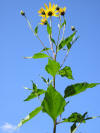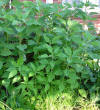WILD
FOODIES' HOME PAGE
PLANT PROFILE LIST
NAME: Jerusalem Artichoke
SPECIES / FAMILY: Helianthus Tuberosus / Asteraceae or Compositae
OTHER COMMON NAME(S): Sunchoke
CONDITIONS: sun
|
PARTS: |
EDIBLE |
TASTE |
RAW/COOK |
SEASON |
|
All |
|
|
|
|
|
Shoots |
|
|
|
|
|
Leaves |
||||
|
Stalk/Stem |
|
|
|
|
|
Buds |
||||
|
Flowers |
|
|
|
|
|
Fruits |
|
|
|
|
|
Pods |
|
|||
|
Seeds |
|
|
|
|
|
Nuts |
|
|
|
|
|
Roots |
|
artichokes |
RAW/COOK |
after frosts |
|
Bark |
|
|
|
|
PORTION: medium
COMMENT: Not sure how "wild" this plant truly is. I only find it where it has been planted by people. Root used as a tuber like potatoes, but tastes like artichoke. Very delicious. The tubers bruise easily and lose moisture rapidly so are best left in the ground and harvested as required. The inulin from the roots can be converted into fructose, a sweet substance that is safe for diabetics to use. The roasted tubers are a coffee substitute. (1)
CAUTION: Jerusalem artichokes contain inulin which can cause mild to severe flatulence in some people (like me). Some suggestions:
-
It seems that the best thing to do is to pickle it, either raw or cooked.
-
Freeze first and/or soak for 24 hours with 2 changes of water before cooking for 45 minutes to mitigate flatulence.
-
The tuber develops a pleasant sweetness during the winter, especially if subjected to frosts, and is then reasonably acceptable raw. (That makes sense, but not sure of source.)
-
More suggestions here - https://modernfarmer.com/2018/02/jerusalem-artichoke-sunchoke-recipe-prevents-gas
Boil in lemon: Sure enough, that’s just what this centuries-old recipe for rendering Jerusalem artichokes fart-free – and one of the few methods of preparation I hadn’t tried – called for: boiling them in lemon juice. Modern science concurs: “Boiling Jerusalem artichokes in an acid such as lemon juice or vinegar will hydrolyze the inulin to fructose and small amounts of glucose,” Rastall advises. So I gave it a try, boiling quarter-inch-thick sunchoke slices for 15 minutes in just enough lemon juice to cover them. They turned out amazingly sweet and still delicious, although – as Rastall had warned – they’d lost some of their artichoke flavor. But the stove-top hydrolysis worked: Eating a heaping bowl of lemon-boiled sunchokes produced no intestinal after-effects whatsoever. Success! (Boiling them in vinegar also hydrolyzes the inulin, I discovered, but leaves them with a harsh, astringent taste.)
Traditional fermentation-style pickling: also removes sunchokes’ gaseous effects – while retaining their artichoke flavor. Gardening mavens Linda Ziedrich and Rose Marie Nichols McGee developed a game-changing recipe that yields completely gas-free Jerusalem artichoke pickles that keep all their wonderful crunch and taste. How? During this pickling process, lactobacillus bacteria gorge on the inulin and convert it to gas, which manifests as bubbles in the pickling jar, rather than your intestines. By the time the pickles are ready to eat, the inulin has already been mostly consumed, and the “bacteria farts” float away painlessly when you open the jar.
NUTRITION/MEDICINAL: Aperient; Cholagogue; Diuretic; Stomachic; Tonic. Reported to be aperient, aphrodisiac, cholagogue, diuretic, spermatogenetic, stomachic, and tonic, Jerusalem artichoke is a folk remedy for diabetes and rheumatism. (1)
LOOK-A-LIKES: sunflowers
POISONOUS LOOK-A-LIKES:
OTHER USES: “Biomass. The plants are a good source of biomass. The tubers are used in industry to make alcohol etc. The alcohol fermented from the tubers is said to be of better quality than that from sugar beets.” (1)
SOURCE LINKS (may include nutritional and medicinal info, plus other uses):



